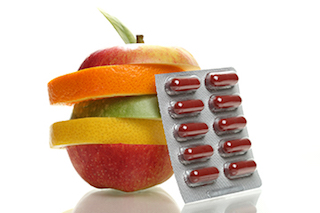5 signs you’ve chosen the right multivitamin
January 20, 2021

As kids, many of us took daily chewable multivitamins, and for a lot of us, that habit has continued into adulthood – about one-third of American adults take multivitamins.
Some people take multivitamins for the comfort of knowing they’re filling potential nutrient gaps. Others take them with the belief that they’re boosting their immune system, improving their brain function or skin tone, or enhancing hair health or health in general.
People who benefit from taking an appropriate multivitamin include:
- Those who are eating or absorbing fewer calories (dieters, for example)
- Some older individuals
- People who have undergone bariatric surgery
Some multivitamins claim to support heart health, but results from the Physicians’ Health Study II and Women’s Health Study suggest that long-term use of multivitamins does not reduce risk of stroke, heart attack, or cardiovascular mortality. Additionally, a recent meta-analysis that included 18 studies, 2,099,262 participants, and 18,363,326 person years, reported that multivitamins did not lower the incidence of stroke or mortality from stroke, cardiovascular or coronary heart disease.
Choosing a multivitamin
It’s ultimately up to you to determine whether taking a multivitamin is right for you. There are many options out there – a trip down the vitamin aisle at your local store might conjure up images of standing before some kind of elaborate 3D periodic table – so I offer the following guidelines to help navigate the multivitamin maze. Look for:

1. USP verification
The U.S. Pharmacopeial Convention – an independent, nonprofit organization – determines whether dietary supplements are pure and contain the ingredients they list on their labels. The organization uses a particular seal, which is pictured at the top of this page. Don’t be fooled by labels that simply use the letters “USP.” Check your multivitamin online to ensure it is USP verified. Additional resources for checking your supplement include, Consumerlab, which evaluates dietary supplements for purity and contamination, and NSF International, which certifies supplement content.
2. Appropriate daily values of ingredients
Choose a multivitamin with 100%of the daily value of most of its ingredients. Some nutrients, such as calcium, can’t be included in a multivitamin at 100% – if it was, the multivitamin would be too large to swallow. Magnesium and potassium levels are kept low to avoid drug-nutrient interactions, so we need to get these nutrients primarily through our diet (see food sources below.). Keep in mind, too, that exceeding 100% of the daily value of certain nutrients is not helpful. Some nutrients – like vitamins A, D, E, and K – can build up in the body and become toxic.
3. The right balance for your age and sex
Nutrient needs vary depending on gender and age. For example, premenopausal women need more iron, while older adults need more calcium, vitamin D, and B6. A dietitian or your family doctor can help you determine how much of specific nutrients you need for your age and gender.
4. Essential micronutrients
Your body needs micronutrients to keep your systems humming. Besides well-known nutrients like vitamin C, calcium, iron, magnesium, and potassium, a good multivitamin will include:
- Thiamin, riboflavin, and niacin
- B6, B12, and folate
- Calcium, magnesium, selenium, and zinc
- Vitamins A (including beta carotene), E, and K
- Vitamin D2 or D3
You can skip multivitamins that are made with additional micronutrients for which there are no recommended daily values (examples: boron, nickel and tin).

5. The nutrients you need
According to the Dietary Guidelines for Americans 2020-2025, American diets often lack calcium, vitamin D, potassium, and fiber. Most multivitamins contain 100% of the daily value for vitamin D, but have limited amounts of calcium and potassium and no fiber. Therefore, even if you take a multivitamin, it’s important to consume foods rich in these nutrients:
- Calcium: Low-fat milk, cheese, and yogurt; calcium-fortified, plant-based milks; orange juice; cereals; tofu (prepared with calcium citrate); and almonds
- Vitamin D: salmon, enriched milk (cow or plant based), fortified orange juice, or cereals and yogurt
- Potassium: Beans and legumes; potatoes; low-fat milk and yogurt; lower-sodium canned tomato products; fruits; and lamb, pork, and fish
- Fiber: Beans and legumes; nuts and seeds; oats and whole grains; and fruits and vegetables
- Magnesium: Nuts and seeds, avocado, spinach, dry beans, whole grains and oats.
What about gummy vitamins?
Preliminary research suggests the median doses of vitamins are often higher than the recommended amounts in gummy versions. Manufacturers are aware that degradation is more likely in the gummy form, so a higher concentration of vitamins may be added to account for this anticipated loss. In addition, iron is omitted due to its metallic taste.
Gummy vitamins may be helpful for those who have difficulty swallowing supplements, but keep in mind that quality may be less consistent due to manufacturing challenges, and that they typically contain sugar or sugar alcohols, so calories will be present.
When to take your multivitamin
Generally, the time of day you take your multivitamin is not important. However, taking it with food may minimize stomach discomfort and aid in absorption. In addition, supplemental calcium and iron bind together in the gastrointestinal track. For optimal absorption of a calcium supplement, avoid taking it with your multivitamin, and if you take Synthroid, take it four hours before or after your multivitamin or calcium supplement for optimal effectiveness.
For more information about multivitamins and healthy nutrition, reach out to our clinical nutritionists. You can request an appointment online or call us at 469-532-6578.










